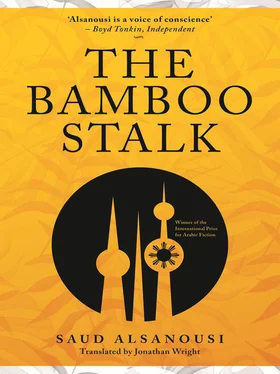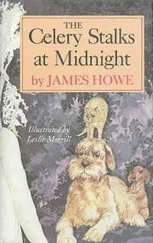‘You’ll find out later,’ I replied.
She was looking at me suspiciously. ‘Where would I find you some oil?’ she asked, then paused a moment. ‘Would cooking oil do?’ I looked at her in disappointment, and she had second thoughts. ‘Olive oil?’ she asked. I agreed to her last suggestion. Khawla called the maid: ‘Luza, Luza!!!’ and from the other end of the sitting room, near the main entrance, came the sound of the parrot. As soon as it heard the maid’s name, it cried out the word that it always attached to Luza’s name.
‘Grandmother and the parrot always shout the same word after they call Luzviminda,’ I said to Khawla. ‘But what does that word mean?’
Khawla blushed. She put her hand behind her head and scowled. Still blushing, she said, ‘It’s himara . It means donkey.’ I repeated the word as she said it in Arabic: himara .
‘Yes, madam?’ Luzviminda said from behind me, asking Khawla what she needed. She asked her to bring the bottle of olive oil from the kitchen.
* * *
Grandmother refused at first but Khawla insisted. She accepted reluctantly. She stretched out her legs on the stool. I sat on the ground near her knees. I soaked the towels in hot water, then wrapped them around her legs. I began to press with both hands on top of the towels. She was looking at me uncomfortably. I asked Khawla to put one of the cushions behind Grandmother’s head and ask her to lean back and close her eyes. I kept squeezing until the last drop of water dripped from the towels. I removed the stool, put one of her feet on my knees and the other one on my shoulder like a grenade launcher. Grandmother took hold of the end of her shawl and covered her face with it. ‘Grandmother’s embarrassed,’ Khawla whispered in my ear, suppressing her giggles. I took the bottle of oil out of the bowl of hot water. I poured just enough of it on to the leg that was on my shoulder. I laced my fingers together and wrapped my hands around her leg, pressing gently, starting with her ankle, then her calf and then her arthritic knee. I massaged it gently with my fingertips. I took her leg off my shoulder and put it on my knee. I took hold of her foot with my hands, pressing the sole with my thumbs. I put my fingers between her toes. I gripped tight and kept pressing. Grandmother started to snore gently. I pulled the stool towards me and rested her leg on it. The snoring stopped. She said something I didn’t understand. I looked at Khawla for an explanation. ‘Grandmother says don’t forget her other leg,’ she said.
I nodded happily. ‘Of course, of course,’ I said. If massaging her legs could have brought me closer to her, I would have spent my whole life doing it.
14
On 20 June 2006, Ghassan called me and asked me to go somewhere with him. ‘Get changed. I’ll come and pick you up in a few minutes,’ he said. I got changed quickly and waited for him to come to my room. He didn’t take long. I got in the car and he drove off towards the place he wanted to take me. ‘Do you remember that Abu Faris that I told you about?’ he asked me on the way. I remembered the name immediately. He was the poet who was captured during the Iraqi occupation because of the poems and songs he wrote urging people to resist. Ghassan told me he was going to say his last farewells to Abu Faris, whose remains had been found in a mass grave near Karbala in Iraq and were now going to be buried in Kuwait. I couldn’t see any reason why this called for Ghassan to take me along with him. Why? I didn’t ask him, but he answered my unspoken question himself anyway. ‘I want you to see how your father was given a hero’s welcome a few months ago. It will also be a chance to visit his tomb,’ he said.
I felt a tightness in my chest. Why did I have to keep hanging on to memories of this man? Why did I have to love him more than I did already? Why now, when he was no longer here? Why was I tormenting myself over a man I had seen only in the days before I remembered anything? Of course I was proud of him, but my sadness overwhelmed all other feelings.
The place was similar to the place where I had seen large crowds on television for the funeral of the Emir on the day after I arrived in Kuwait. It was where they buried the remains of people who had been captured by the Iraqis and had died in captivity. A large sandy area, with gravestones arranged in horizontal lines. Many people had come to say farewell to their loved ones. They were all men in military uniform, with not a woman among them. There were some prominent people, apparently — the ones in traditional dress with cloaks of various colours — black, brown, grey — all edged in gold cloth. The remains of the dead were covered with the Kuwaiti flag, as the Emir had been the day I arrived. I asked Ghassan if my father’s remains had been covered with the Kuwaiti flag like them and he nodded. I liked the flag and from that moment I felt that the Kuwaiti flag was my flag too.
Ghassan’s face was sad enough already, but when he cried it was even sadder and the sadness spread to me like an infection. Lots of people were looking at me and whispering to each other, apparently surprised that I was there. Damn my face! I had so many names but my face stayed unchanged, alarming the people around me.
One of them held out his hand to shake hands with Ghassan. One of them kissed it. One of them hugged him, his body trembling as he tried to hold back his tears. Do they really cry for their dead after all those years?
The burial ceremonies ended and the men dispersed one by one. Ghassan pointed to a place not far off. ‘Rashid will be pleased to meet you. I swear he can hear our footsteps now as we approach,’ he said. I shivered. I felt as if ants were crawling on me, from my neck up to my forehead. We walked towards my father’s grave with heavy steps. At the grave Ghassan crouched and prayed. When he’d finished he said, ‘I’ll drive over to visit the grave of my mother and father. I won’t be long.’
Suddenly I was alone in my father’s presence. I looked back to see Ghassan stepping carefully between the graves towards his car. Of course he looked sad when all those he loved were in their graves.
I sat on the ground next to the grave. I put my hand down and picked up a handful of soil. ‘Papa,’ I said. If I hadn’t started like that, I would have burst out crying. I was choking on my words. All the pictures of him I had seen — in Ghassan’s drawer and in my mother’s briefcase — passed through my mind. I thought of all the happiness, all the fun, all the love and bravery that lay buried in that grave. My lips trembled. ‘Papa,’ I repeated, and because I have my father’s voice, I unintentionally answered myself: ‘Is that you, Isa?’ Tearfully I nodded. ‘Yes, it’s me. I’ve come back to Kuwait, Papa,’ I said. ‘I’m lying in peace now, my son.’ Tears poured from my eyes and I wiped them away with my dusty hand. The tears turned to mud on my face. I was crying so much I couldn’t speak. I couldn’t say anything. I didn’t tell him that I loved him and needed him, that I was an outcast, that my grandmother didn’t know what to do with me, that my aunts didn’t want to recognise that I existed, that I was alone and weak. I wasn’t able to say all that or, since he couldn’t do anything about it, to say I wanted him just to rest in peace.
Ghassan’s beloved car called and I got to my feet. I turned my back on the grave and headed to the car without looking back. On the way I tried in vain to control my sobbing. Ghassan didn’t say anything until we were close to Grandmother’s house. ‘Are you OK?’ he asked.
‘Yes, I’m fine,’ I replied.
He looked down at my hand. ‘Why are you clenching your fist like that?’ he said.
I opened my hand. ‘A handful of my father’s dust,’ I said.
Читать дальше












